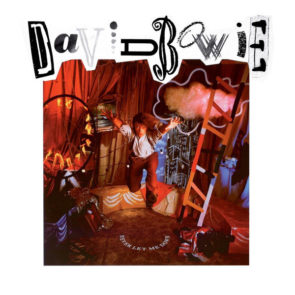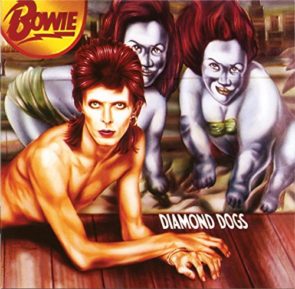
David Bowie (it is known) often used characters, such as Ziggy Stardust, The Thin White Duke, and The Other One.
Here, in 1987, we see the debut of his shortest lived and most controversial character: Suck Man.
Suck Man’s origins are shrouded in mystery. He appeared once on this album, and then never again. David himself never spoke about him, and some Bowie historians claim he never existed at all. But by carefully listening to this album (from another room, wearing a HAZMAT suit) I can now reveal his full, tragic story.
Who is Suck Man? Essentially, he is the sad remains of a once successful rockstar, haunted by his glory days. He has no grasp at all on what his fans want or what might sell, so he’s trying to do everything at once. French horns? Here you go! Rapping? Yeah, he can do that too! Guitar solos? You bet! How about french horns, rapping, and guitar solos all at once, thrown together in a way that doesn’t make sense?! Imagine a whole album like that?! W…Wouldn’t that be wonderful?
Suck Man is not a malicious figure. He’s sad, and pitiable. He clings to your ankles, begging for your acceptance. He’ll do anything. He just wants to be loved. If only he could be a hero again, if just for one day.
Never Let You Down is extremely bad, but at least it’s not bad in a boring way, like Tonight, or in an insufferable way, like Tin Machine I. It has entertainment value. There are songs I’ve listened to more than legit good Bowie tracks, and that’s saying something. The most obvious things wrong: the ridiculous production and arrangements. These aren’t songs, they’re crime scenes. The gated snare drum is obnoxiously loud. The backing singers are hideously overbearing. Bowie’s vocals vacillate between R&B and proto-Britpop. The album really does sound like 2 or 3 Michael Jackson tracks playing over the top of each other, all out of step.
It actually contains a little bit of good music – maybe more than Tonight did. “Time Will Crawl” has a cool, slinky saxophone line and a set of strong musical ideas. The Iggy Pop cover “Bang Bang” cooks nicely and ends the album well. Both these songs have twenty things shoved into them that don’t work and which I outright hate, but I see the skeletons of good music inside the layers of cancerous blubber.
Midway through the burnout of this musical Hindenburg, we get “Glass Spider”, which is not the worst song, but certainly the most embarrassing. Baby spiders have lost their mommy. Suck Man practically gift-wrapped this track for you. Not only is this track on the album, he actually titled the accompanying toured, and it was the second track. For God’s sake, at least Paul McCartney had the decency not to subject us to a “Wonderful Christmas Time” tour!
Suck Man also likes socially conscious lyrics. This was the era of Live Aid and Hear ‘n’ Aid, where every rockstar wanted to make a difference. Don’t ever play this to a former African child soldier. The gated snare will trigger PTSD flashbacks to AK-47s in the trenches of Sudan.
The rest of the album is ghastly. You listen in morbid fascination. Believe it or not, there’s an even worse track (“Too Dizzy”) that Bowie took off the record out of shame. Imagine being too bad for Never Let You Down – it’s like playing Mike Tyson’s Punch-Out and getting KO’d by Glass Joe.

“Transition…” – David Bowie, “TVC15”, Station to Station
He was right to muse on it, because transition is interesting. Not medical transition (though that must have intrigued him also), but philosophical transition. Ship of Theseus. Lumpers vs splitters. Much of philosophy is based around the question “when does a thing become something else?”
Is transition a continuum, like day becoming night? Or can it be quantified into discrete steps? Historians have spent countless hours wargaming World War II, trying to isolate the point where Hitler definitely lost. Was it 1940, when the Luftwaffe was crushed in the Battle of Britain? 1941, when the United States entered the war on the Allied side? 1942, when Stalingrad held? When was the final moment that Germany could have won World War II, and after which, they absolutely couldn’t? And how thinly can we slice the bratwurst? A month? A day? A single second?
Aladdin Sane is an exposition of transition. We see Bowie at a cracking point, where fame was becoming overwhelming, a burden. He invented a new character, a guy with worms filling his brain and white-ants eating his bones, but his confusion was no fiction. Over the next year his backing band would either leave or get fired, unable to handle his egomania and drug abuse. The paranoid Berlin years have their genesis here.
Musically, it’s fierce and punishing: along with The Man Who Sold the World, this is the heaviest thing Bowie ever recorded. But it has an experimental side that, again, seems like a preview trailer for Berlin. Transitions. Beginnings and ends.
We see both sides of the album, right out of the gate. “Watch That Man” is a loud party song – Bowie (perhaps in character, probably not) is at a party, noticing scenes of glitz and glamour and pronouncing them merely “so-so”. Maybe it’s not even that. Maybe it’s about to become a nightmare.
“Aladdin Sane (1913-1938-197?)” is the end stage of that party. The song is dominated by a 45-bar avant-garde jazz solo by pianist Mike Garson. Surely Bowie’s brilliance was becoming impossible to deny by now. Damned well nobody else was doing stuff like this in 1973. What’s the meaning of the dates in the titles? 1913 was the year before World War I. 1938 was the year before World War II. Does this mean that Bowie thought that the third World War would happen in the 70s? And did it?
“Cracked Actor”, “Jean Genie,” and “Let’s Spend the Night Together” are homages to or parodies of the Rolling Stones. The guitars crush and maul, and his vocals sound both inspired and exhausted. “Time” sees a new influence popping up: Jacques Brel, who he discovered via Scott Walker. “The Prettiest Star” is a lovely song: it was originally his failed second single, here remade with Ronson’s guitars and some added backup vocals.
The album overflows with great music, but two songs overshadow the others.
The first is “Panic in Detroit”, anarchic and violent, a track which burns with the guttering energy of a trash fire. The female backing vocals pull its genre way from rock, making it sound as indeterminate as any riot. The second is “Lady Grinning Soul”, a delusive opium dream made music. I like it every bit as much as “The Bewlay Brothers”, which means Bowie scarcely ever wrote a better song.
Aladdin Sane is far tighter (and a good bit better) than Ziggy Stardust. The Mick Jagger meets Jiminy Cricket character of Ziggy Stardust evolved into Aladdin Sane, a manic guy caught between two transition points and being torn apart by fame. The trip is finishing, and the come-down has begun. This is 3am insomnia, the album: paranoid, anxious, and still unable to sleep.

David had a remarkable talent for throwing fragments down at random and having them form a complete picture. Diamond Dogs is a fractured album with mismatching halves (the first a concept about a post-apocalyptic gang that rides around on rollerskates, the second an abortive attempt at a stage musical version of Orwell’s 1984) but it ends up being one of his most complete-sounding records.
The halves feed each other, and bleed onto each other. The post-apocalyptic tracks form an optimistic beachhead, which the 1984 side effectively quashes. First the fire, then the flood. I’m reminded of Harlan Ellison’s A Boy and His Dog: gaudy adventures in the wreck of the Earth, with a grim final page.
The title track is probably the worst song: it sets the tone, but doesn’t get out of the way when it should. Why is it six minutes long? It’s the most blatant homage to the Rolling Stones Bowie ever wrote, and one of the last. Sometimes I skip it.
“Sweet Thing/Candidate/Sweet Thing Reprise” is a genius-touched epic, farmed from William S Burrough’s technique of cutting up lines and reassembling them (again with the happy accidents). Bowie’s singing is wonderful, and the mood established by the scrambled lyrics are delirious scissored photographs of urban decay. The three tracks are curiously interchangeable, they all seem to work fine on their own, or in any order. Maybe their positioning is itself a cut-up.
Then “Rebel Rebel” opens with its scorching signature guitar riff, played by Bowie himself. This was his first studio release without Mick Ronson, and he seemed eager to upstage his former axeman. There’s interesting production elements going on in “Rebel Rebel”. Rock guitarists typically lay down two guitar tracks side by side (one panned left, the other right.) Bowie, it appears, only recorded one, panned dead center. This gives his tone a sharper, more brittle sound (compare “Rebel Rebel” with “Watch that Man” or “Hang Onto Yourself”), it cuts rather than bludgeons. It’s a great riff, however it was recorded. There’s a legendary story about how tennis legend John McEnroe (fresh off of Wimbledon), attempted to play it in his hotel suite, and botched it so badly that Bowie himself overheard from the room below, and banged on the door to correct him.
As with “Diamond Dogs”, “Rebel Rebel” feels gaseous. There’s a perfect ending point at 3:30 that Bowie blows right past, continuing for another minute. Rock DJs soon got into the habit of dropping the axe at three and a half minutes, and soon Bowie was doing the same (as you can hear yourself from the version on Reality, for example). Some of David’s songs (eg “Breaking Glass”) grew longer with time: this one grew shorter.
Then the 1984 half of the album begins, which is the stronger side. The songs work marvelously, whether alone or together, and there’s no pacing issues evident.
“Rock ‘n Roll With Me” is the last dance before the war begins. “We are the Dead” is a descending vamp through parlous gray madness, with none of “Rebel Rebel’s” optimism. The tinkling organ sounds aggressively and effectively fake – the sort of musical instrument they’d have in Oceania.
“1984” is a fascinating funk rock experiment, quite similar to the music on Young Americans. Then the album’s greatest track arrives, the astonishing “Big Brother”. “Chant Of The Ever Circling Skeletal Family” ends the album in primitive violence. The sudden, jarring end (in the middle of “Brother”) is particularly effective.
There’s still another story to Diamond Dogs which has nothing to do with apocalypses or Orwell: David succesfully staying in the game as an artist. At the time, the glam genre he’d hung his hat on was falling to pieces. For the first time, T-Rex’s new album was not a top 10 hit, and they never had another one. Mott the Hoople had failed to follow up “All the Young Dudes”. Was Bowie next? Would he join the rest of the glam rockers in obscurity, paved over by uncaring history?
Happily, Diamond Dogs was the album that achieved escape velocity, breaking free from Planet Glam. He left his old style behind, revealing that it had needed him more than he neededit. This is more than an album. It’s the sound of David fighting for his life and winning.



